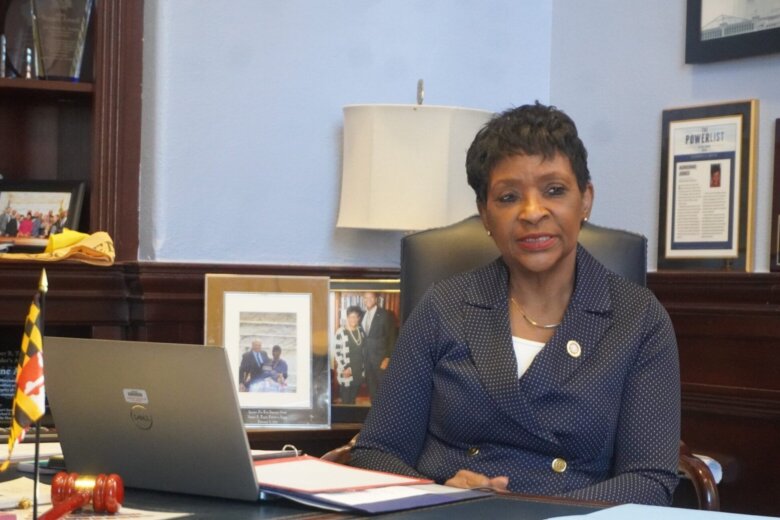This article was republished with permission from WTOP’s news partners at Maryland Matters. Sign up for Maryland Matters’ free email subscription today.

As she begins her sixth legislative session leading the House on Wednesday, Speaker Adrienne Jones (D-Baltimore County) admits that a projected $2.7 billion deficit will be the dominant issue for lawmakers — but she doesn’t believe it has to be the only one.
“I understand the importance of the budget as a tool to protect our most vulnerable Marylanders,” she said during an interview last week in her office in Annapolis. “We [have] tough budget and revenue decisions to make. Despite these fiscal realities, we do plan to protect the investment we made in education, health and transportation.”
One way to safeguard Marylanders is to craft “proactive” legislation against the administration of President-Elect Donald Trump (R), who’s scheduled to be sworn-in Jan. 20. Jones said one proposed piece of legislation would focus on protecting the Affordable Care Act.
According to the Kaiser Family Foundation, the Trump administration could use an executive order to “quickly” implement changes to the act, such as shortening the open enrollment period, approving or rejecting state waivers, or removing protections for those in the LGBTQ community.
Any House bills to protect the ACA would be handled by the House Health and Government Operations Committee, chaired by Del. Joseline Peña-Melnyk (D-Prince George’s and Anne Arundel), who Jones praised as a committee chair residents can depend on and who has “got your back.”
It’s unclear what other policies a Trump administration may try — he or his proposed agency heads have talked of mass deportations, slashing federal regulations and workforce, halting offshore wind energy and reevaluating vaccination policies, among other plans. But Jones said to “stay tuned” for other possible legislation to blunt any such changes, such as protection of minority business enterprises programs and affordable housing.
Meanwhile, the speaker said she is working on her own package of bills focused on “social equity laws,” though she had few details to share last week.
“We need to support communities that have been historically and disproportionately affected by certain policies,” she said. “These bills are still in drafting right now, so only thing I can tell you is stay tuned.”
This year’s proposals could mirror a package of bills the speaker championed last year that she called “the decency agenda.” The main measure included the protection of books and other materials in schools and public libraries, and prohibited retaliation against employees for adhering to state standards on the issue.
It was sponsored by Del. Dana Jones (D-Anne Arundel) and signed into law in April. It went into effect immediately to make Maryland one of the first states in the nation with strong protections to preserve access to information in libraries, among other provisions.
Other legislative priorities
Jones said the House and Senate plan to work together on addressing energy, a topic mentioned last month at the Maryland Association of Counties winter conference in Cambridge.
She also noted another topic discussed at the conference: the Blueprint for Maryland’s Future education reform plan.
Last year, the legislature approved a bill tweaking parts of the Blueprint – House Bill 1426 – such as altering student-teacher ratio (maximum of 20 children per classroom) for a qualified provider who receives a prekindergarten expansion grant.
Some state lawmakers and school leaders have argued recently that changes are needed to the costly and sweeping Blueprint plan, now in its third year of implementation.
But Jones said “the House will have a high bar for any cuts to the Blueprint. As we continue to invest more and more every day in pre-K, K-12 [kindergarten to through 12th grade] and child care, we have to make sure these investments are building capacity. We must make sure that we are getting every dollar out of every investment we make in our public schools.”
She continued: “Additionally, when it comes to the independence of our public education system, we will protect our students from a federal agenda that will harm the most vulnerable students to score cheap political points.”
As for Trump himself, Jones simply said, “I’m not in favor of that man at all.”
When it comes to criminal justice reform, Jones said the House Judiciary Committee plans to review a report last month on the state Department of Juvenile Services (DJS).
The report, conducted by the Office of Program Evaluation and Accountability, had several recommendations, including that DJS should collection data “that allows for provider-level assessment of effectiveness based on youth outcomes.” In its response, the agency said it “remains committed to collecting data and expanding data collection tools to enhance data to ensure youth outcomes are at the optimal level and current providers are effective.”
In terms of other criminal justice issues, Jones credited the partnership with Gov. Wes Moore (D) and his administration, especially when it comes to measures approved by the legislature, compared to former Gov. Larry Hogan (R).
“When it comes to our criminal justice system, I feel confident that we have the tools in place for proper oversight, reform and rehabilitation,” Jones said. “For the first time in a decade, we have an administration that is willing to use the public safety reforms the legislature has passed and is more concerned about getting it right, rather than just looking tough on crime.”








